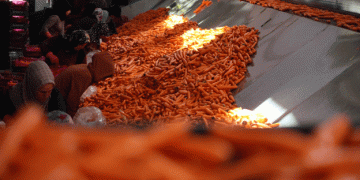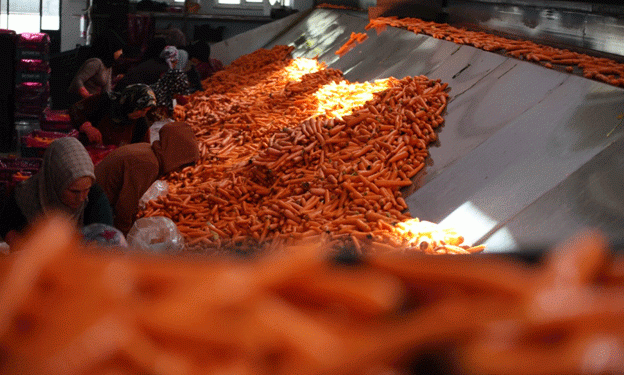In the heart of Turkey’s agricultural hub, Konya, carrot production has evolved dramatically over the last 20 years. With its fertile soil and ideal climate conditions, Konya’s Meram district, particularly the Kaşınhanı region, has become a significant center for carrot farming. Currently, over 80,000 decares (8,000 hectares) of land are devoted to carrot production, and with the integration of advanced agricultural technologies, the output has surged by an astonishing 500%. This technological leap has positioned Konya as the leading carrot producer in Turkey, providing 70% of the nation’s carrots and exporting a significant portion to international markets.
Technological Transformation in Carrot Farming
Carrot farming in Konya has benefited immensely from the introduction of mechanized equipment, allowing for greater efficiency and productivity. Farmers have adopted state-of-the-art tools, including air-powered seeders, large-scale tractors, drone-based spraying systems, and advanced conveyor systems. These innovations have drastically reduced the need for manual labor, cutting the workforce required for harvesting and packaging from 150 workers to just 10, while increasing the precision and quality of the product.
Oğuzhan Özcan, a leading carrot producer in the region, emphasizes how technology has reshaped their farming practices. “Twenty years ago, we needed an army of workers to harvest, wash, and package our carrots. Now, with mechanization, the entire process is streamlined, and we can deliver better-calibrated, high-quality produce with minimal manpower,” he explained. The implementation of systems like automated washing pools and hydraulic trucks has further reduced labor costs and increased the speed of operations.
Year-Round Production and Market Demand
One of the key strengths of Konya’s carrot industry is its ability to produce carrots for 11 months of the year, thanks to sequential sowing and harvesting methods. Despite facing extreme temperatures, with summer highs reaching 35 degrees Celsius, the region’s carrot factories continue to operate without pause, ensuring a consistent supply to both domestic and international markets.
Konya alone produces 450,000 tons of carrots annually, out of Turkey’s total production of 650,000 tons. This capacity enables the region to not only satisfy local demand but also export large quantities to foreign markets. According to Burak Kırkgöz, Chairman of the Konya Branch of the Chamber of Agricultural Engineers (ZMO), the unique color, aroma, and quality of Konya’s carrots make them particularly appealing to international buyers. “Our carrots are highly sought after abroad because of their vibrant color and rich flavor, making them a top choice for export,” Kırkgöz remarked.
Economic Challenges and Price Discrepancies
Despite the technological advancements and increased production, farmers in Konya face significant economic challenges, particularly when it comes to pricing. Özcan highlighted the widening gap between farm-gate prices and consumer prices, especially in cities like Istanbul. “The price difference between what we sell and what the consumer pays is staggering. While we sell carrots at 4 to 6 lira per kilogram, by the time they reach Istanbul markets, they’re priced at 20 to 25 lira,” he noted. This discrepancy is driven by various factors, including transportation costs, market fees, packaging expenses, and intermediary commissions.
The rising costs of inputs, such as fuel and fertilizer, combined with the limited profitability over the last two years, have added to the burden on carrot producers. Even with high-tech equipment and optimized processes, the returns on investment are diminishing, as farmers struggle to balance production costs with shrinking margins.
Export Growth and Quality Standards
Despite these challenges, Konya’s carrot industry continues to thrive on the strength of its export market. International demand for Turkish carrots remains strong, thanks to the high quality of the produce. Farmers in Konya adhere to strict quality control measures, ensuring that exported carrots meet the standards required by European and Middle Eastern markets.
The adoption of technology has played a crucial role in maintaining these quality standards. By utilizing advanced equipment for harvesting, cleaning, and packaging, Konya’s carrot producers can ensure that their product remains fresh and visually appealing, which are key factors in international trade.
Konya’s carrot production is a testament to the power of technological innovation in agriculture. Over the past two decades, advancements in machinery and automation have not only increased the efficiency of carrot farming but have also improved the quality and consistency of the produce. However, challenges such as pricing discrepancies and rising input costs remain significant hurdles for farmers. As Konya continues to lead the way in carrot production, the focus on technology, market access, and sustainability will be critical in ensuring the long-term success of the industry.































